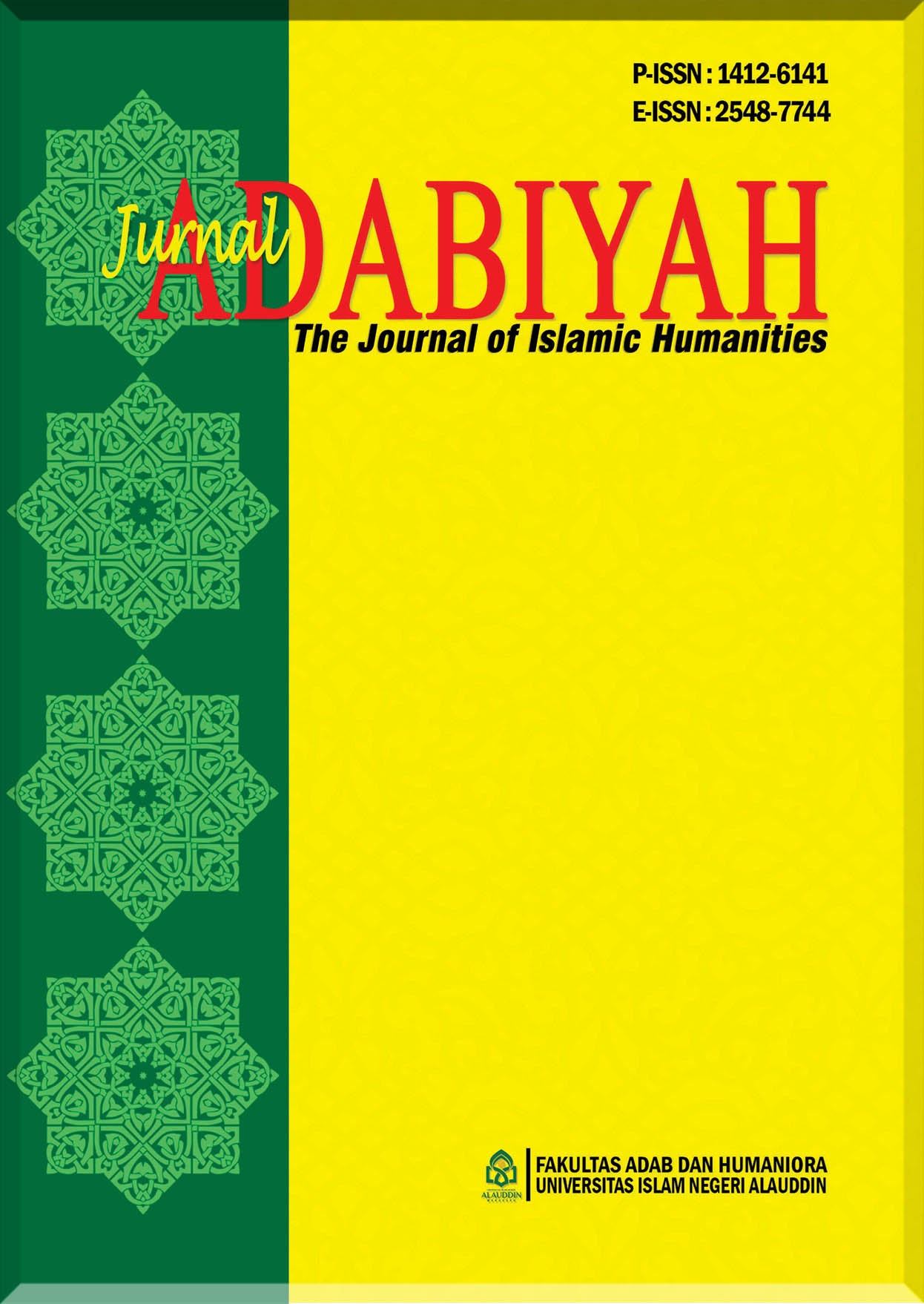Hassan Hanafi’s Actual Theology: From Anthropocentrism to Revolution
DOI:
https://doi.org/10.24252/jad.v25i2a10Keywords:
Actual, Anthropocentric, Phenomenology, Theocentric, TheologyAbstract
Religion in the contemporary era is often predicted to lose its relevance, as human dependency on transcendence is replaced by material progress and routine practices. Theocentric discourse dominates theological studies while social reality receives insufficient attention. This research aims to explain Hassan Hanafi’s concept of actual theology as a liberation-oriented alternative capable of reconnecting faith with concrete social struggle. This research employs qualitative library research using phenomenology as the analytical framework, centered on Hassan Hanafi’s primary text Min al-ʿAqīdah ilā al-Thawrah and supported by his project al-Turāth wa al-Tajdīd. The findings show that Hanafi reconstructs Islamic theology by shifting its epistemological axis from a purely theocentric-dogmatic orientation toward a theological anthropocentrism focused on justice, liberation, and historical agency. The research concludes that Hanafi’s actual theology offers a transformative paradigm: from creed to revolution, from metaphysical doctrines to social emancipation, providing a substantive contribution to contemporary Islamic theological reform.
ملخص
غالبًا ما يُتوقع أن يفقد الدين في العصر الحديث أهميته مع استبدال الاعتماد البشري على التعالي بالتقدم المادي والروتين. كما تُركز الدراسات اللاهوتية بشكل أكبر على مسألة الله وحده، تاركةً الواقع الاجتماعي البشري دون تطور. تهدف هذه الدراسة إلى شرح المفهوم اللاهوتي الحالي لحسن حنفي كشكل من أشكال لاهوت التحرير الذي يسعى إلى ربط الإيمان بالنضالات الاجتماعية الملموسة. تعتمد هذه الدراسة على مراجعة نوعية للأدبيات وتحليل ظاهراتي من خلال دراسة نقدية لعمله الرئيسي، "من العقيدة إلى الثورة"، ومشروعه "التراث والتجديد". تُظهر النتائج أن حنفي أعاد بناء اللاهوت الإسلامي بتحويل توجهه المعرفي من لاهوت مركزي-عقائدي إلى لاهوت مركزي-بشري، مُركزًا على العدالة والتحرير والدور التاريخي للبشر. تخلص هذه الدراسة إلى أن الفقه الحنفي يقدم نموذجًا تحوليًا: من العقيدة إلى الثورة، ومن المذهب الميتافيزيقي إلى التحرر الاجتماعي، مما يُسهم إسهامًا كبيرًا في تجديد الفقه الإسلامي المعاصر
Abstrak
Agama pada era kontemporer kerap diprediksi kehilangan relevansinya karena ketergantungan manusia pada aspek transendensi semakin digantikan oleh kemajuan material dan rutinitas. Studi-studi teologi juga lebih banyak berkutat pada persoalan Tuhan semata, sehingga realitas sosial manusia kurang mendapatkan tempat. Penelitian ini bertujuan menjelaskan konsep teologi aktual Hassan Hanafi sebagai bentuk teologi pembebasan yang berupaya menghubungkan akidah dengan perjuangan sosial yang konkret. Penelitian ini merupakan penelitian kepustakaan dengan pendekatan kualitatif dan analisis fenomenologis melalui telaah kritis terhadap karya utama Min al-ʿAqīdah ilā al-Thawrah serta proyek al-Turāth wa al-Tajdīd. Hasil penelitian menunjukkan bahwa Hanafi melakukan rekonstruksi teologi Islam dengan menggeser orientasi epistemologisnya dari teosentris-dogmatis menuju teologi antroposentris yang berfokus pada keadilan, pembebasan, dan peran historis manusia. Penelitian ini menyimpulkan bahwa teologi aktual Hanafi menawarkan paradigma transformatif: dari akidah menuju revolusi, dari doktrin metafisik menuju emansipasi sosial, sehingga memberikan kontribusi signifikan bagi pembaruan teologi Islam kontemporer.
Downloads
References
Aisyah. 2011. “Hassan Hanafi dan Gagasan Pembaruannya.” Sulesana: Wawasan Keislaman 6(2). https://doi.org/10.24252/.v6i2.1402.
Akhtar, Shabbin. 2002. Merancang Teologi Pembebasan Islam. Bandung: Nusa.
Downloads
Published
How to Cite
Issue
Section
License
Copyright (c) 2025 Dadan Firdaus, Resa Restu Pauji

This work is licensed under a Creative Commons Attribution-NonCommercial-ShareAlike 4.0 International License.
COPYRIGHT AND LICENSE STATEMENT
COPYRIGHT
Jurnal Adabiyah is published under the terms of the Creative Commons Attribution license. Authors hold the copyright and retain publishing rights without restriction to their work. Users may read, download, copy, distribute, and print the work in any medium, provided the original work is properly cited.
LICENSE TO PUBLISH
1. License
The use of the article will be governed by the Creative Commons Attribution license as currently displayed on http://creativecommons.org/licenses/by/4.0.
2. Author’s Warranties
The author warrants that the article is original, written by stated author/s, has not been published before, contains no unlawful statements, does not infringe the rights of others, is subject to copyright that is vested exclusively in the author and free of any third party rights, and that any necessary written permissions to quote from other sources have been obtained by the author(s).
3. User Rights
Under the Creative Commons Attribution license, the users are free to download, reuse, reprint, modify, distribute and/or copy the content for any purpose, even commercially, as long as the original authors and source are cited. No permission is required from the authors or the publishers.
4. Co-Authorship
If the article was prepared jointly with other authors, the corresponding author warrants that he/she has been authorized by all co-authors, and agrees to inform his/her co-authors of the terms of this statement.
5. Miscellaneous
Jurnal Adabiyah may conform the article to a style of punctuation, spelling, capitalization, and usage that it deems appropriate. The author acknowledges that the article may be published so that it will be publicly accessible and such access will be free of charge for the readers.




